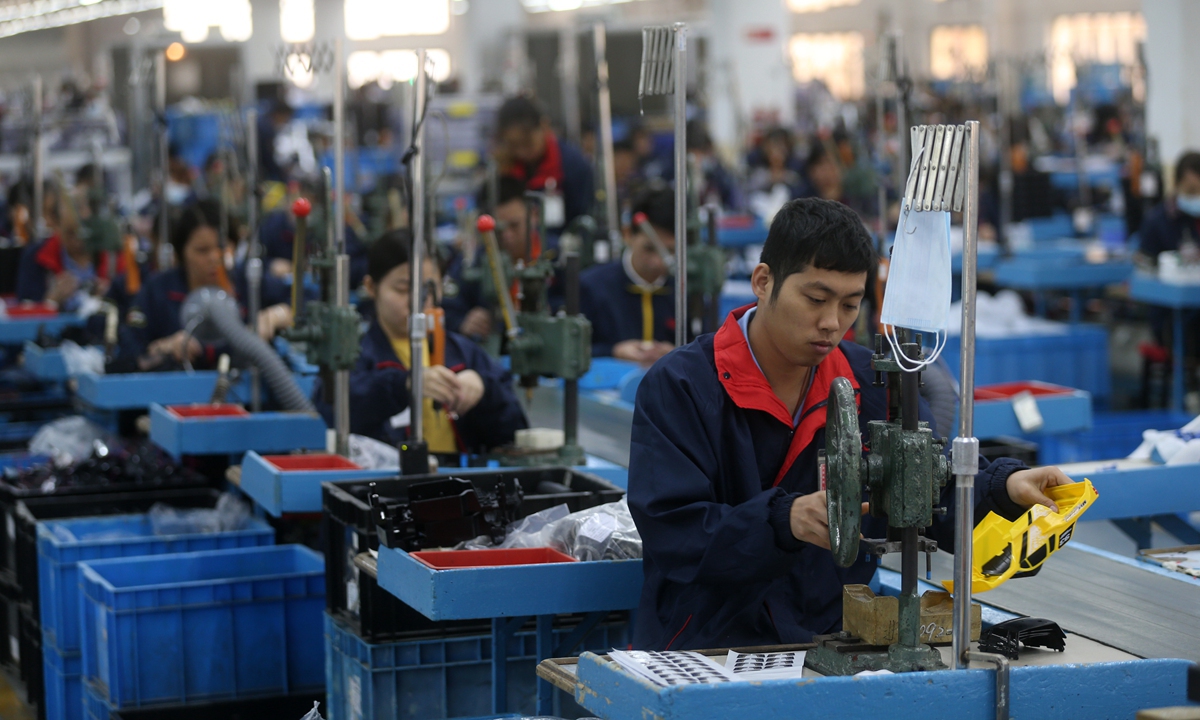
Employees of Masito work on production line in the company workshop in Dongguan, South China's Guangdong Province on December 16. Photos: Cui Meng/GT
China would increase support for small businesses and sole proprietors by cutting payment fees to power a stronger recovery from the COVID-19 pandemic, said China's central bank ahead of the International Micro, Small and Medium-sized Enterprises Day, which was celebrated on Sunday.
The People's Bank of China (PBC) vowed recently that it would lower payment fees for small firms from September 30 in areas such as bank account services, yuan settlement and electronic banking.
The fee reductions are estimated to total 24 billion yuan ($3.7 billion) per year, of which more than 16 billion yuan will benefit small businesses and sole proprietors.
The measure aims to improve the business environment and promote consumption, the PBC said in a joint statement with the country's banking regulator, market regulator and top economic planner on Friday.
China has been extending support for small businesses that were severely hit by the COVID-19, with continued, targeted tax and fee cuts and favorable borrowing terms.
In 2020, China cut taxes and fees 28 times in seven rounds, saving businesses 2.6 trillion yuan during the year, according to official data.
The State Council, the cabinet, announced at a meeting in March new policies to support the economy this year, particularly tax cuts for privately owned, smaller businesses.
This year, another round of tax cuts worth 550 billion yuan is to be implemented to support small and micro-sized enterprises, manufacturing enterprises, and scientific and technological innovation enterprises, according to the State Council.
From April 1 to December 31, 2022, the threshold for value-added tax (VAT) for small-scale taxpayers will be increased from the current monthly sales of 100,000 yuan to 150,000 yuan.
Liu Gezhu, a small business owner in Tianjin, told the Global Times on Sunday that the support comes as a silver lining to survive the pandemic.
"In the past, we had to pay 4,000 yuan of VAT a year, but now we basically don't pay it. Borrowing costs are getting lower, and the process of applying for a license is getting faster," Liu said.
In terms of inclusive financing, the PBC said that it would further extend policies for deferring the repayment of financial inclusion MSE loans until the end of 2021, in tandem with the extension of other credit loan support policies.
During a State Council Executive Meeting in May, it was stressed that China will crack down on hoarding and speculation that push up the prices of raw materials.
A restaurant owner in Shanghai surnamed Wang told the Global Times that rental costs and rising raw material prices are the biggest burdens for small restaurants like his.
"Prices are rising, especially soybean oil. It is hoped the country can roll out more measure to rein in the prices," Wang said.
At the end of April, there were more than 44 million small and micro-sized enterprises and 95 million solely owned businesses in China.




